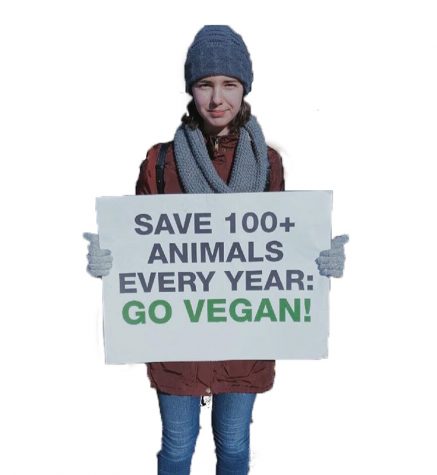Leaf-ing meat behind
Most Americans see foods like bacon, chicken and beef as part of an everyday meal. But Kate Reynolds, sophomore, sees something more. Reynolds is vegan, and has been since January 2017.
“I originally went vegetarian in August 2016,” Reynolds said. “I realized that I wasn’t really aligning with my beliefs just to go vegetarian, and [that’s when] I decided to go vegan.”
Reynolds said she became vegan after she realized that billions of animals die each year just to be consumed by humans. According to PETA (People for the Ethical Treatment of Animals), over 108 billion animals per year are killed for human consumption.
“Animals are sentient beings just like humans,” Reynolds said. “They have relationships and families. They are able to feel pain just like us. They’re slaughtered, and they don’t want to be killed.”
Reynolds is also critical towards the dairy industry. According to PETA, animals are routinely abused in the meat and dairy industries. In order to produce dairy, cows are artificially inseminated and become pregnant in order to produce milk. Once born, their offspring are then shot onsite or taken away immediately to be killed for veal. This cycle continues until the cow’s body wears out and is killed.
The abuse animals face prompted London Bielicke, sophomore, to eventually switch to a plant based diet. Bielicke said she would watch YouTube videos to educate herself on animal rights issues.
“I became vegan because I like animals,” Bielicke said. “I saw [information] online about what eating animal products is doing and [animal consumption] seems really hypocritical. I didn’t want to be like that so I decided to help the cause by going vegan.”
One prominent vegan YouTuber is Sorsha Morava, who is well known for her strong criticism of animal product consumption. She has made YouTube videos for over three years and promotes veganism through her channel. While she first went vegan for health reasons, she said she then learned about the ethics of veganism.
“I watched people who brought the ethics part of veganism to light for me,” Morava said. They made me realize how important it was to talk about the ethics and stand for that and speak up for it.”
In addition to not eating meat or animals products, Reynolds took her opposition to animal cruelty one step further by participating in an animal rights march in downtown St. Louis, where she marched against the use of fur and animal products. She believes that the death of any animal is wrong, and inhumane.
“Something that I really disagree with is ‘humane slaughter,’” Reynolds said. “I don’t believe humane slaughter [exists]. How can you kill something that doesn’t want to be killed?”
Veganism has grown 500 percent since 2014, and about 2.5 million people are vegan in the United States. Although more people are vegan than ever before, vegans at KHS are a minority. Reynolds said that although there is a meat club, there is currently no club for vegans or vegetarians. Only .38 percent (1/273) of KHS students are vegan. Many people don’t go vegan because many vegan foods are expensive or inaccessible. Bielicke recently switched to vegetarianism after being vegan for two years due to the inaccessibility of vegan products. Grocery store chain Schnucks recently eliminated a section of their stores that was only vegan products. While not for everyone, she says everyone should at least try being vegetarian or vegan.
The environmental impact of meat production also causes many to go vegan. According to the Food and Agriculture Organization, meat production is one of the leading causes of water pollution and loss of biodiversity. Morava said that people should think about the environment when considering a plant-based diet.
“Doing your research is so important when it comes to veganism,” Morava said. “When it comes to ethics and the environment and why veganism is so important because [veganism] gets this stereotype that it’s all about the animals but it’s so much bigger than that. It’s also about the humans. It’s also about this planet that we all live on and share. Hopefully future generations will be able to enjoy this planet as well.”
Your donation will support the student journalists of Kirkwood High School. Your contribution will allow us to purchase equipment and cover our annual website hosting costs.

Interests: Music, politics, podcasts.
Favorite musical artist: Can’t name just 1: Beyoncé, Taylor Swift, slayyyter, Kim Petras, gaga, Ariana grande,...









Ray • Mar 3, 2019 at 7:11 am
Does these saintly vegans live in home that sits on land that was once habitat for precious animals? Is that home in a subdivision perhaps that completely ruined an entire area where the deer and antelope roamed free? Was a bird’s nest disturbed and a sentient being killed when it fell out of the nest when bulldozers knocked down a tree to clear space for the suburban home she lives in? How about the land on which the power plants that heat and light her home reside – was that previously habitat for animals that got displaced? Stores she frequents? Is it possible that an animal got hit by a car and died while looking for a new place to dwell? Starved to death because of suburban sprawl? Drowned because the rivers around St Louis have flood so easily because their floodplains have been altered due to sprawl? Does she wear clothing grown from fibers that have adverse effects on the eco-system and caused an animal to die? Has any one of these vegans ever had a bird fly into their windshield while driving to a store that sits on a former animal habitat to buy their vegan food?
Ugh…